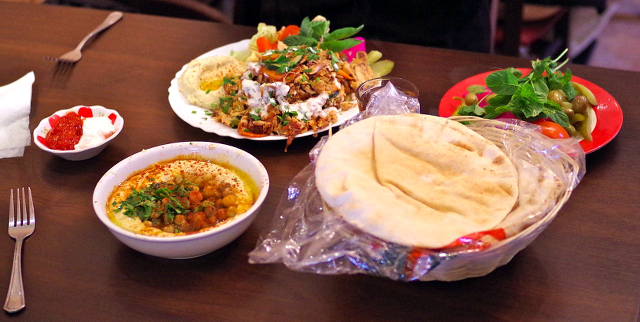The culture of food is directly connected to the politics of scarcity. This is especially true when it comes to environments that have been bombarded by war. The Gaza Strip is a perfect example. Even before Israel conquered the area, its population had always been marginalized. In keeping, every low point in Gaza’s history has been eclipsed with time. Today, it’s one of the poorest, most densely populated areas in the world.
The Gaza Kitchen, by Laila El-Haddad, and Maggie Schmitt, attempts to explain the culinary history of the region through the lens of contemporary politics. Despite the Anthony Bourdain quote on the cover and the food-centric marketing – El-Haddad is currently on a book tour of the United States, giving readings and cooking demonstrations – it would be impossible for her book to be about anything but politics.
Even though the recipes make up two thirds of the volume’s content, it’s the stories about Gaza, about the history of ingredients and recipes, and about people’s relationships with food, that form its backbone.
Tellingly, in the introduction, the authors speak about the reactions they received when they explained they were interested in food and not politics: “When they discovered we did not want to talk about political parties or border crossings but about lentil dishes, there was a moment of astonished delight before they launched into the topic.” Food is by nature exciting, and family recipes and traditions even more so.
Scarcity is one of Gaza Kitchen‘s most recurring themes. For example, Gazans are extremely reliant on international aid for many basic ingredients. That can an enormous huge impact on what can and cannot be made.
While this is part of the day-to-day life in the region, it becomes an all-encompassing nightmare when Israel shuts down the borders, which is certainly not a rare occurrence. Some food will be smuggled in through underground tunnels at the Egyptian border at Rafah, which is something discussed in detail in the book. However, it is never enough to sustain Gaza’s nearly two million residents.

The Gaza Strip is all of 25 miles long, and between four and eight miles wide – which, at roughly 140 square miles, approximates a medium-sized American city. There is only so much space for agriculture and industry. The latter is especially hard to establish in Gaza, where there is little startup capital for investment, and a ridiculous amount of risk for any business. There are always political and bureaucratic hurdles, but there’s also the worry that an Israeli missile might level your building, like what happened in 2008 during Operation Cast Lead, when the Israel Defense Forces decimated Gaza City and the surrounding area.
Despite the heartache and shortages, or perhaps as a reaction to it all, Gazan cuisine is richly nuanced and multi-faceted. Garlic and hot peppers feature prominently in the hundreds of recipes in the book, which cover everything from basic breads and salads to intricate dishes like the famous upside down casserole, maqlauba, which the authors call, “the all-star of Palestinian dishes.” The stories alongside the recipes include profiles of farmers and factory workers as well as cooks of all types, short articles on topics such as “Gazan Food in Context” and “On Wild Greens and Foraging,” not to mention personal anecdotes connecting food with greater Palestinian society.

The Gaza Kitchen was published earlier this year by Just World Books, an activist-oriented American imprint that has mainly published books on Middle East politics, particularly the Israel/Palestine conflict. The only other book in their catalogue that is comparable subject-wise is Gaza Mom, which was also written by El-Haddad, who maintains a blog under the same moniker. Despite attempts at marketing The Gaza Kitchen as a cookbook, one would be hard-pressed to imagine other publishers allowing their authors the same freedoms to speak so openly about Israeli human rights abuses – in the context of a book about regional cuisine.
Is The Gaza Kitchen a fringe document, only appealing to those who already on board with the pro-Palestinian message? Does the average foodie even care to know about how Israeli bombings have severely damaged Gaza’s lone power plant, thus limiting local factory output? The book’s authors, and indeed everyone connected to its publishing, would of course hope that’s the case. Hence, the inclusion of the Bourdain endorsement on the front cover. It’s not just an attempt to legitimate the book’s recipes. It signifies approval of its politics, as well.
Bourdain recently toured Gaza with El-Haddad for his travel show Parts Unknown, which airs on CNN. On that episode, which was titled “Jerusalem, West Bank and Gaza” (no mention of the words Israel or Palestine,) the chef visited with a number of people on all sides of the conflict – including both settlement leaders and anti-occupation activists – though the conclusions he reached were decidedly pro-Palestinian. There was something of the zeitgeist, to them.
As public opinion around the world continues to move in that same direction, the Israeli government and its supporters are becoming increasingly isolated. Communities that were previously unequivocally bound to the country and its actions, both positive and negative – US Jews being a great example of this – are slowly but surely shifting. Even in Washington, which has long been under the political stranglehold of the conservative American Israel Public Affairs Committee, liberal organizations like J Street are starting to gain mindshare.
While these are small victories, it oftentimes feels like that’s the only way leftwing Middle East advocacy will gain momentum. Cookbooks like The Gaza Kitchen, and Yotam Ottolenghi and Sami Tamimi’s extremely popular Israeli-Palestinian Jerusalem, that are aimed at non-political audiences, speak to where things stand.
Recently, Ottolenghi met with the authors of The Gaza Kitchen for a Bon Appétit feature, where they discussed Gazan culture, and the politics of food in both Israel and Palestine. Though Jerusalem is a far less political book, it certainly does not shy away from pointing fingers and speaking frankly about the effects of occupation. While in the past such a book would have had a hard time finding a publisher, even considering the culinary pedigree of the authors, Ottolenghi and Tamimi are international celebrities.
Someday, perhaps, all of these cultural efforts will translate into an effective political force. When they do, though it will obviously have to be international, in character, it will also have to be fully steeped in Palestinian traditions. These include resiliency, courage, ingenuity, and – as The Gaza Kitchen repeatedly recommends – lots of hot peppers.
Photographs courtesy of Joel Schalit and the European Commission. Published under a Creative Commons license.





